The Ultimate Guide to SEO for Law Firms
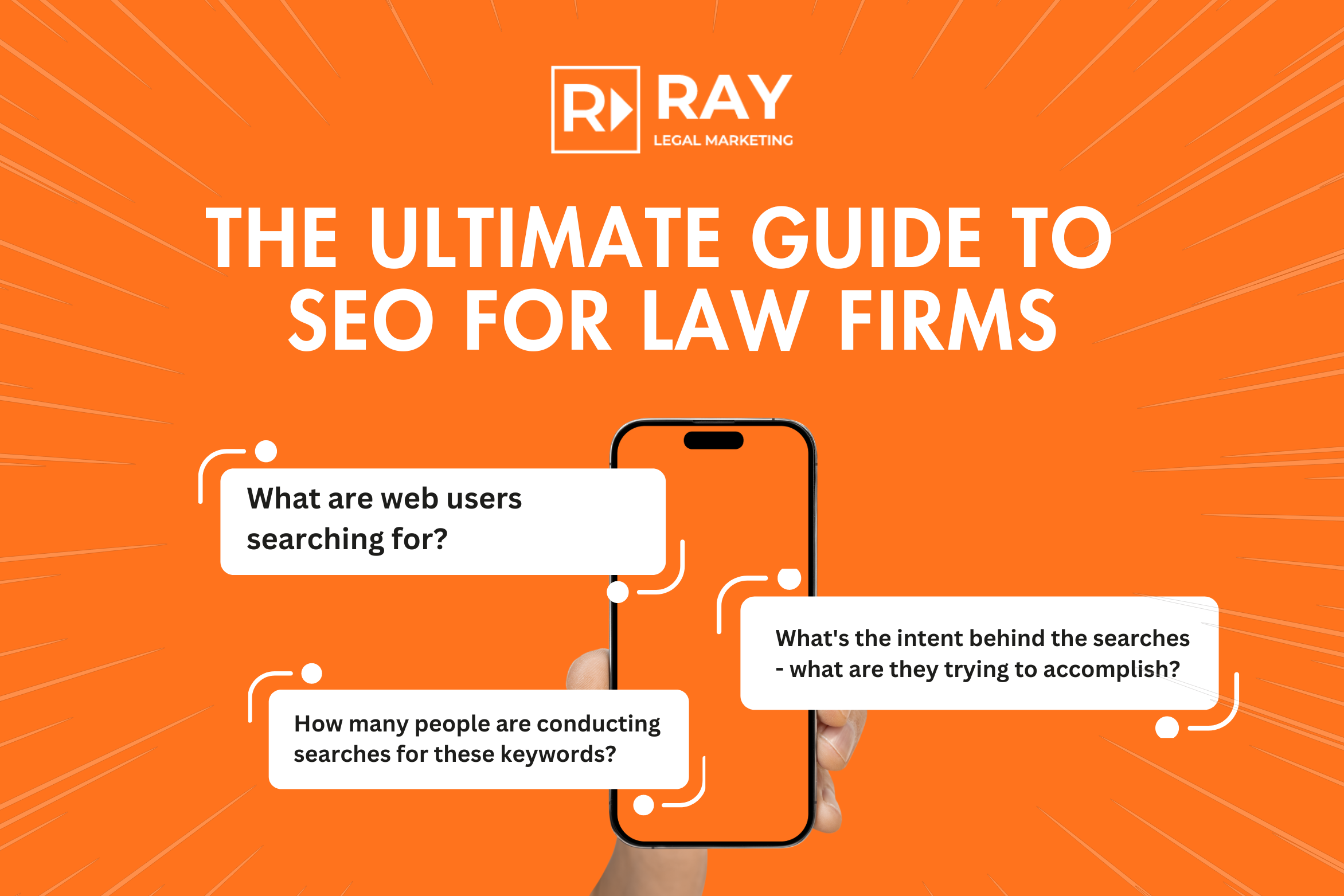
Table of Contents
Did you know that 96% of your potential clients search for legal advice online? Gone are the days of flipping through the Yellow Pages to find out about law firms. That’s why you need to rank your firm to the #1 position in Google’s search results.
Check out these legal stats:
- 62% of legal searches are non-branded.
- Websites on the first ranking position are 10x more likely to get clicks than those on the other pages.
- 74% of people visit a law firm’s website to take action.
When your clients are going online to find information, you must be their first option. And if it’s difficult for people to discover your law firm, you’re most likely losing out on potential clients.
This is where SEO for Law Firms comes in. It is one of the most effective ways for law firms to attract quality clients.
To help beginner law firms, we have carefully crafted this guide to let them know how to get to the top of search engines.
From the importance of SEO to its fundamentals, we have got you covered.
Let’s dig in,
What Is SEO For Law Firms?
SEO for law firms is about getting your law firm’s website to the top of the search engine results page. A perfectly executed SEO strategy helps you rank higher in search engines which in turn increases traffic to your website.
More traffic means more chances of converting your potential clients. Legal SEO not only helps law firms increase their visibility but also helps them stand out from the competition, build their authority, and generate more leads and inquiries.
SEO for law firms is a digital marketing tactic that depends on various factors such as keyword research, link building, quality of the content, citation building, onsite optimization, technical aspects, and performance metrics.
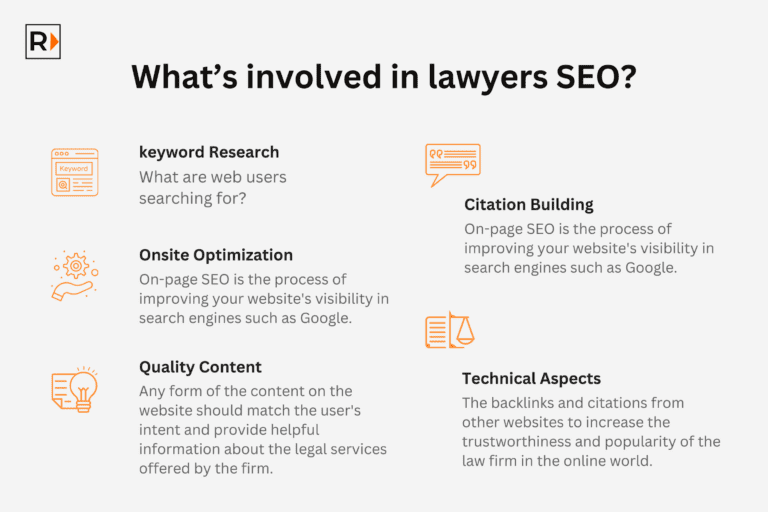
So all of these factors strive to make your law firm website a high-quality and relevant resource when someone searches for it. Even Google itself says:
“Search engines exist to help you find the most relevant and high-quality search results.”
The more boxes you check, the more you’ll reap Google rewards.
Why is SEO important For Law Firms?
Law firms must invest in search engine optimization to increase online visibility, establish credibility, drive website traffic, and gain a competitive edge. 17% of law firms are found via online searches, making SEO an effective marketing method.
Law firm’s SEO has always been an integral part of their marketing strategy since potential clients search for law firms online.
Online search reality is this: 65% of all clicks come from the top five organic search results. In other words, law firms whose rankings are higher will undoubtedly get more traffic.
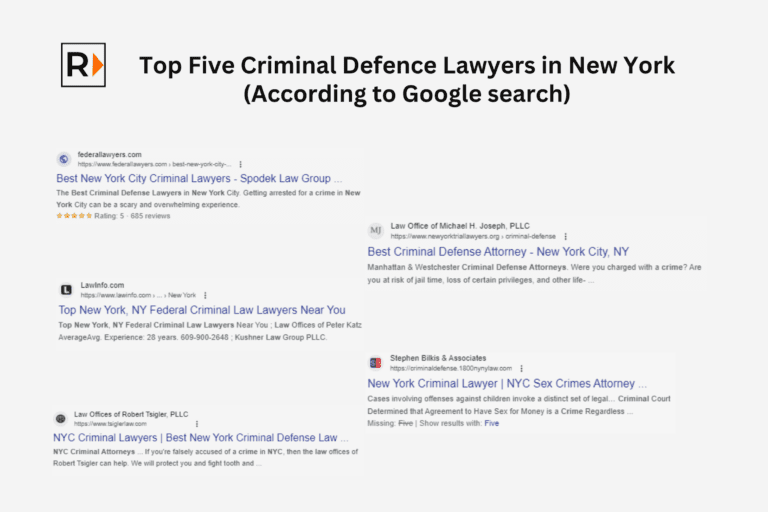
Consider this: how often do you search for a product on the fifth page of Google?
That is exactly why ranking high is so important for your law firm in 2024. And SEO helps you do everything you can to get your site ranking on that first page for searches that matter.
Some other benefits of SEO for law firms:
- Apart from increasing your visibility, SEO can help you differentiate yourself from your competitors and stand out in a crowded market.
- You can provide better service to your visitors and enhance your retention rate by optimizing your website for user experience, accessibility, mobile-friendliness and speed.
- It also helps you position yourself as a thought leader in your practice area by creating unique and valuable content.
- SEO can help you measure and improve your performance and return on investment (ROI).
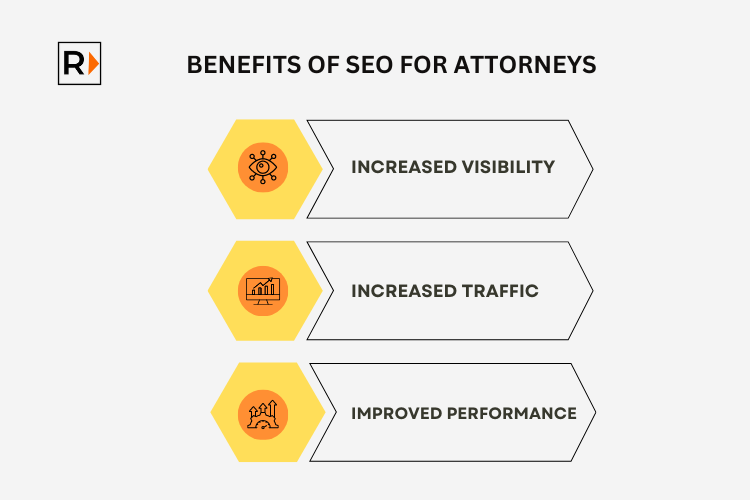
In addition, you can monitor various metrics such as conversions, bounce rate, traffic, click-through rate (CTR), and more with tools such as Google Analytics or Google Search Console.
By analyzing this data, you can determine what works and what doesn’t, and adjust your strategy accordingly.
The SEO process for law firms is not a one-time task but an ongoing process that needs to be monitored, analyzed, and improved continuously. It is an investment that can pay you in the long run if done correctly and strategically.
Law Firm SEO Factors To Rank Higher On Google?
In order to succeed in law firm SEO, you must understand how SEO strategies relate to ranking factors. A website’s SEO ranking factors determine where it appears in search results based on the criteria search engines use.
Search engine rankings can be enhanced if you align SEO efforts with these factors, including website structure, backlinks, on-page SEO, mobile-friendliness, quality content, and user experience.
By implementing SEO strategies that target these ranking factors, your website will become more visible, attract organic traffic, and improve its overall rankings. You can achieve online success faster and more easily if you take the time to understand and address these factors.
So what factors does Google consider most important when deciding what is the “best ”?
There are over 200 factors that Google considers when ranking a law firm’s website, but we believe these are the most important:
- Content
- Link building
- Technical SEO
- User experience
- Onsite optimization
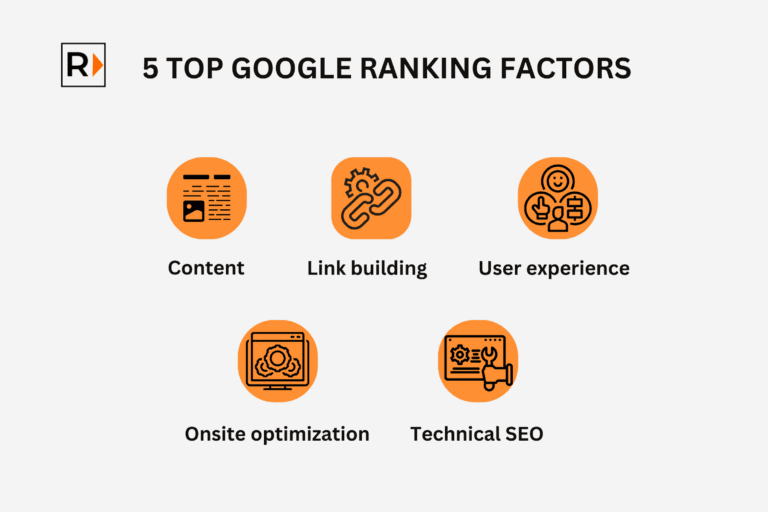
Law firm SEO really boils down to that. It’s inevitable that you’ll rank higher for valuable keywords if you pay attention to these ranking factors.
Below, we’ll dive deeper into the ranking factors we think are important to understand.
Factor 1: Content
In SEO, content is king, and Google rewards websites that provide informative, useful and engaging content related to the user’s query and intent. A good website must have both user-friendly and search engine optimized content.
Before moving forward, let’s have a look at what website content actually refers to. It could be anything from articles, videos, and practice area pages to podcasts. Whatever the form of your content, be sure to make it relevant, informative, keyword-optimised and easy to read.
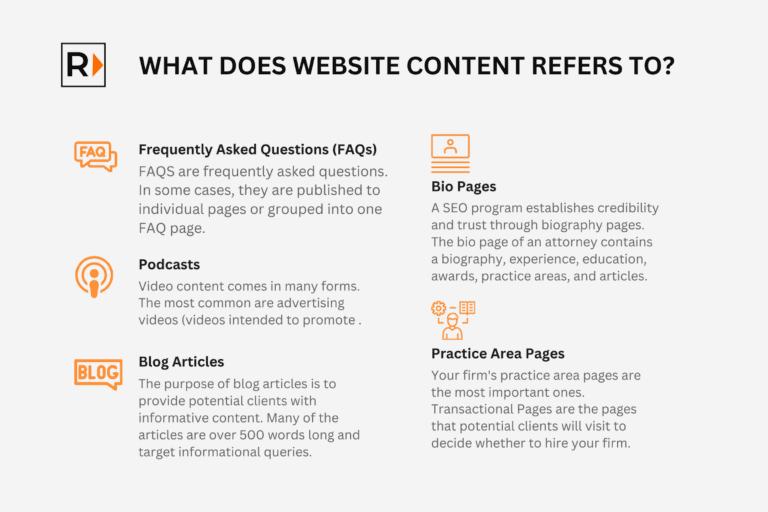
Your site’s unique content helps you rank for more keywords, secure multiple positions in SERPs, and reach more people.
Your SEO opportunities and online presence will be enhanced if you commit to content marketing and integrate a blog into your website.
Factors That Google Use To Evaluate Your Content
For your content to rank well on Google, it needs to be useful, and high-quality. You should create content that is different from or better than what is already ranking for the keyword you’re targeting
Expertise, authority, and trustworthiness are E-A-T criteria that Google considers when reviewing your content.
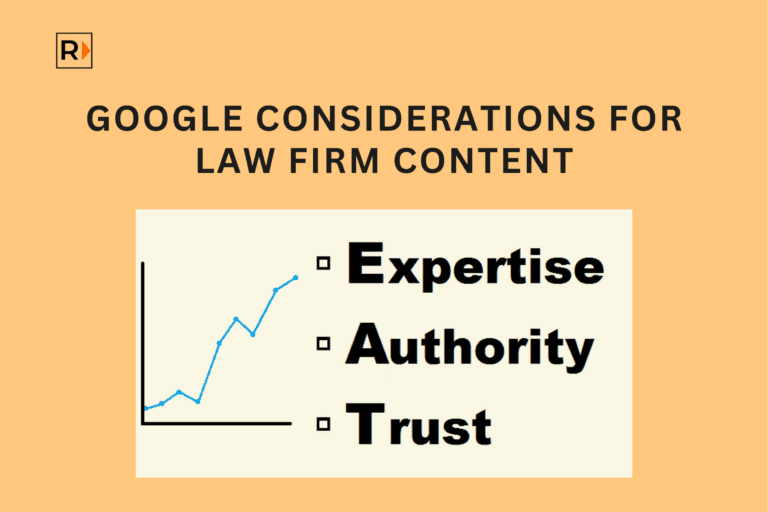
To achieve this, your content should demonstrate your understanding and credibility of the topic. Plus it must contain accurate and reliable information that can be verified.
Expertise:
This involves creating content that is perfectly suited to the user’s needs. There is more to it than just the keywords they use.
It’s about the reasons why they turned to Google in the first place. Google perceives the quality of your content based on the length of time your users spend on your site and how engaged they are.
Authority:
The recognition you receive from others is a sign of your authority. You achieve this by linking to reputable websites and sharing your content widely.
Trustworthiness:
The goal here is to avoid any negative feedback from users. Many factors can affect your trust score, including negative reviews, high bounce rates, an unsecured HTTP domain, or a subpar mobile experience.
In addition to this, Google takes your content’s originality into account. Rather than copying or duplicating content from other sites, your content should provide unique insights, perspectives, or information that adds value to your readers. To prevent unintentional plagiarism, you can use tools such as Copyscape or Grammarly.

The above example showcases a blog on a topic that not every law firm discusses which makes it unique and original.
Last but not least, Google considers the relevance and freshness of your content in relation to the user’s query and intent.
You need to ensure your content matches the user’s search intent, whether it is informational, commercial, informational or transactional in nature.
Your content should include the keyword naturally and appropriately throughout, and you should structure it in a logical, clear, and logical way. Keyword research is a broad term that covers alot more than this which we will discuss in further sections of this guide.
There is no wrong platform, the key is finding the one most suitable for your business needs and activities. Depending on your target audience, content preferences, and other factors, you can assess which platform is right for you.
Let’s have a look at the best social media platforms that lawyers should consider.
Modifying Content According To User Intent
Your website content must answer common questions and concerns that potential clients may have.
To put it another way, you need to understand what prospects are searching for when they browse the internet.
In reality, great content should be written for humans first, and then optimized for search engines.
A high-quality piece of content begins with the reader and then integrates keywords and phrases naturally.
Keyword research is important, but search intent is even more crucial. Ensure that your content matches search intent – in other words, it should answer the question the user is trying to answer.
What is their intent for the search? How do they use Google to search? What is their goal?
There are four common types of search intent:
- Informational: When the user wants to get information and knowledge regarding anything online. For example: when you search for “Importance of SEO for law firms” you have an informational intent.
- Navigational: The consumer wants to search for a specific website or page that they already know or have visited before. For example, if the user searches for “Ray Legal Marketing”, they have a navigational intent.
- Commercial: The researcher wants to compare products or services before making a purchase decision.
- Transactional: The user’s searching for when they browse the internet.
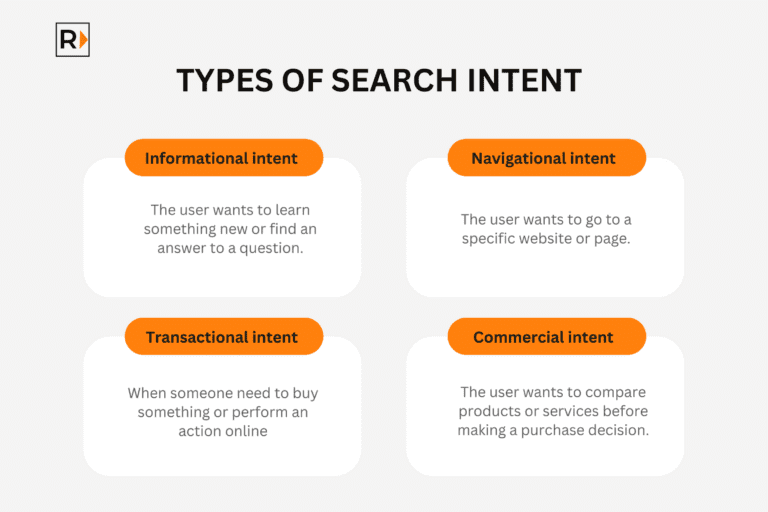
It is easier to create highly relevant content when you know what the user is looking for. This will help you reach more users who are interested in your niche if you create content that achieves this.
The more engaged your visitors are on your website, the higher your rankings will be. Your content’s engagement tells Google that it’s relevant, interesting, and useful.
Factor 2: Onsite Optimization
Page-level optimization – also called onsite optimization – is one of the main factors that contribute to Google ranking.
A page’s search engine optimization revolves around its content and media. How well it is organised and managed across the web page.
If you want your page to succeed, it can’t just be a bunch of words and images. It is crucial that you follow best practices and guidelines to ensure that Google and your visitors can easily crawl, index, and understand your pages.
There are many things to consider when it comes to page-level optimization, and we’ll cover them all in the section below.
However, for now, it’s enough to know the importance of following items:
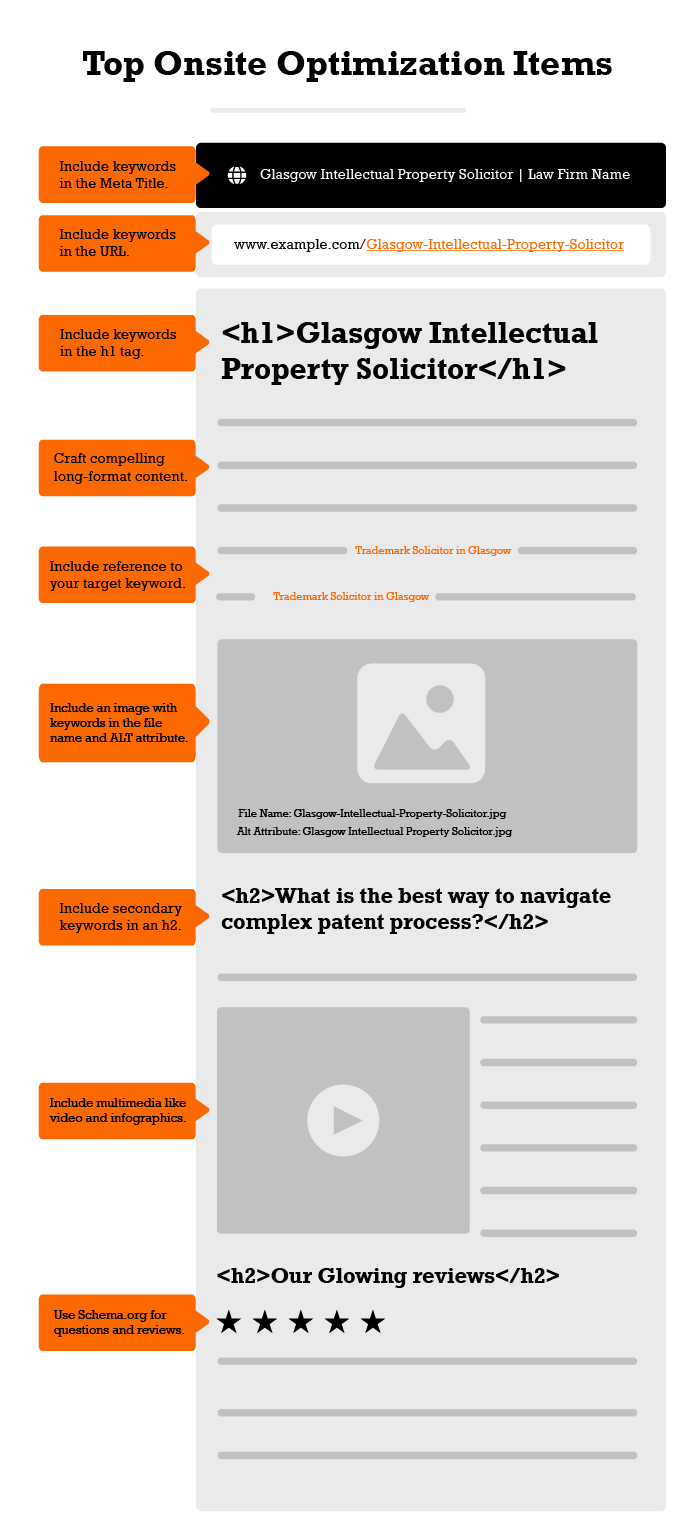
Factor 3: Link Building
Links from other websites to yours are referred to as backlinks. Backlinks from authoritative and relevant sources influence your search engine rankings. When Google sees that others trust your content, it will consider you an authority in the field.
In order to be sure that you have acquired high-quality links you need to make sure they fulfil these three criteria:
- Quality: Is the source website highly authoritative? Then it is considered to be of higher quality than those with a low domain authority.
- Quantity: What percentage of links on your site are quality and relevant? Google will give your website a higher ranking if more backlinks are pointing to it.
- Relevance: Is the website relevant to your practice? A link from an unrelated source may carry less weight than one from a highly related source.
Sources From Where You Can Get Links
There are a lot of sources, including guest posting sites legal directories, media outlets, etc.
Some of the best sources are:
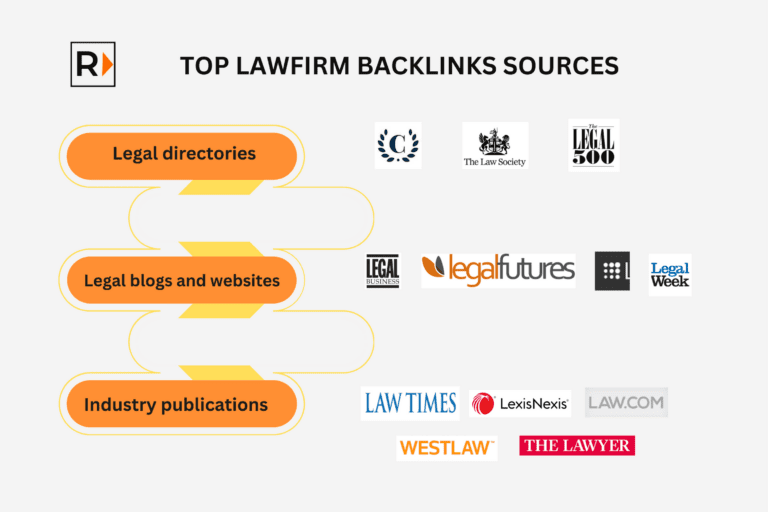
Factor 4: User Experience
An individual’s experience with a website and its content is called their user experience (UX). People will flow seamlessly through the buyer’s journey if you have a good UX on your website.
If you design your site to make it easy for visitors to find what they’re looking for, they’ll do just that. By addressing pain points directly, you’ll prevent users from getting confused and leaving.
When comparing similar content on multiple pages, page experience plays an important role.
Core Web Vitals plays an important role in this process. There are three main Core Web Vital factors to pay attention to, plus a few extras.
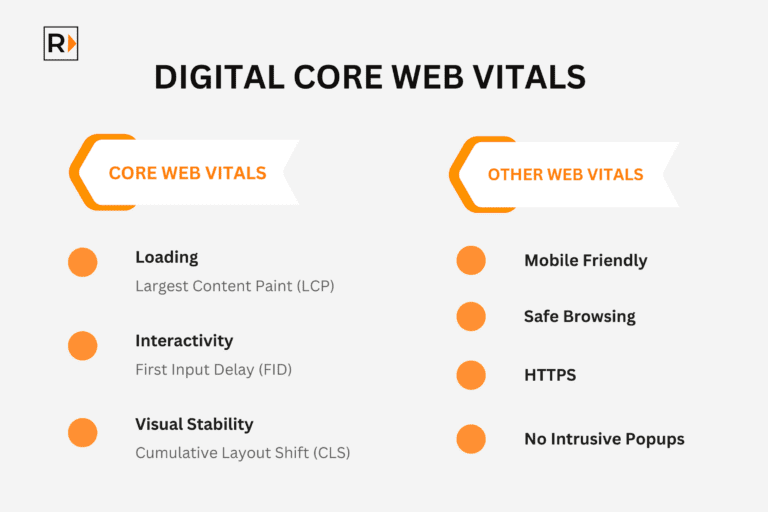
An intuitive UX helps visitors find what they need effortlessly. You can quickly direct them to the information they need when they arrive at your site.
Your site’s users won’t become frustrated and leave if you address any concerns or problems directly.
Your website’s UX determines how long visitors stay on your site and how likely they are to contact you. Page Experience improves dwell time and reduces bounce rate naturally, two easy-to-track components.
Bounce Rate:
It measures the percentage of visitors leaving a website after viewing one page. This should be as low as possible. High bounce rates are a sign of poor user experience.
Dwell Rate:
A visitor’s dwell time is the amount of time they spend on a particular page. The longer the dwell time, the more relevant and engaging your content is.
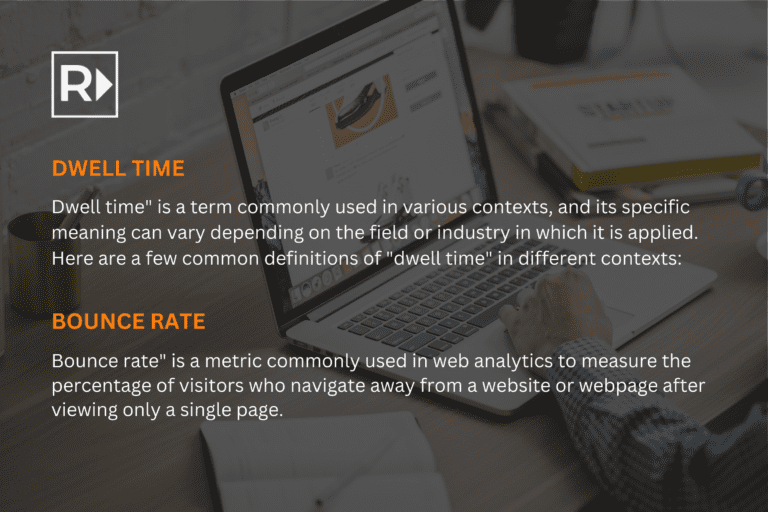
Finally, we’d like to talk about mobile-friendliness in relation to Page Experience.
Mobile devices account for 86% of organic search traffic in the U.S.
Google switched to mobile-first indexing because of this huge majority. When deciding where to rank your content, Google primarily considers your mobile version of your website.
Therefore, your website should be responsive and mobile-friendly. For an enjoyable experience on all devices, including mobile devices, a responsive website will automatically adjust to the size of the screen being viewed.
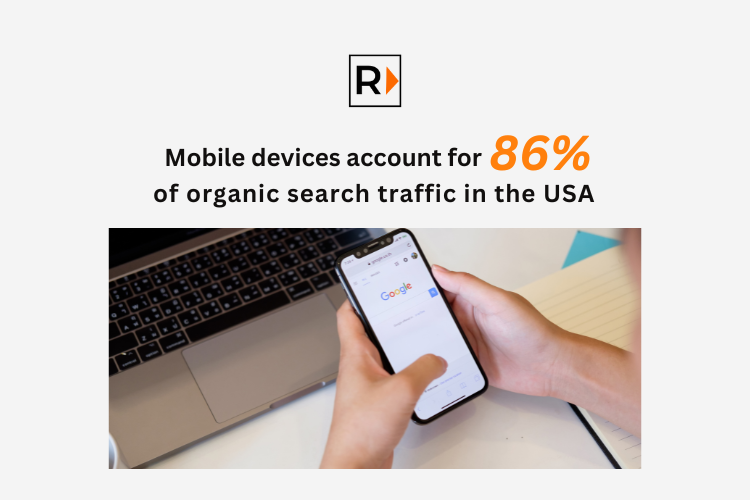
Factor 5: Technical SEO
Having a strong technical SEO strategy is crucial to the success of any SEO campaign, and it has a significant impact on a law firm’s online presence.
Basically, it is a measure of how well your law firm’s website can be crawled and indexed by search engines, which focuses on factors like mobile-friendliness, sitemaps, security, and site speed.
It is also important to have a secure website. This means that it has a valid and updated security certificate (SSL). A lock icon and “HTTPS” should appear at the beginning of your URL.
On-page SEO is the process of improving your website’s visibility in search engines such as Google. It refers to the practice of optimizing website elements such as URLs, title tags, content, etc.
On-page SEO should not be confused with the term off-page as these both involve different processes. In on-page SEO, you have control over optimising the elements on your website and making direct changes to improve SEO.
Whereas off-page SEO indirectly affects your website’s ranking. It involves activities outside your website, such as managing your online reputation and link building.
Why On-Page SEO For Law Firms Is Important?
When your potential clients sit down to find a law firm, they are most likely to use Google. In fact, in one of the surveys by the National Law Review, 96% of people in need of legal advice perform an online search.
That’s why you need to focus on on-page SEO to become more visible online and attract potential clients to your website.
There are roughly 8.5 billion searches conducted by Google every day, and 53.3% of all website traffic comes from organic searches.
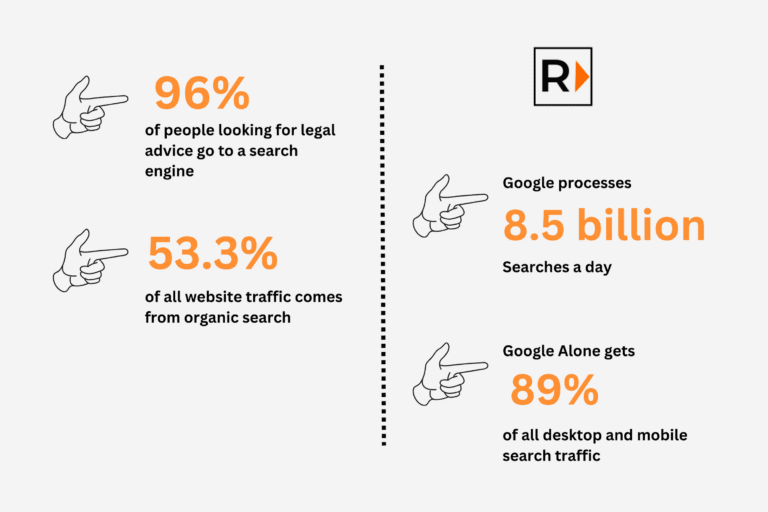
6 Key Elements Of On-Page SEO For Law firms:
Now let’s dive further into each of the elements important to on-page SEO ranking:
1. Keyword research and optimization:
Keywords are the top most component of law firms on-page SEO. It’s the very foundation of SEO and your content. By using the right keywords you will attract organic traffic to your website.
What are keywords?
When you want to search for something online you enter certain phrases or words into a search engine. These words or phrases are called keywords, and they help you find the information, services, or answers you are looking for.
Your goal is to rank your website and appear on the top of SERP whenever people search for keywords related to your legal practice.
There are two types of keywords:
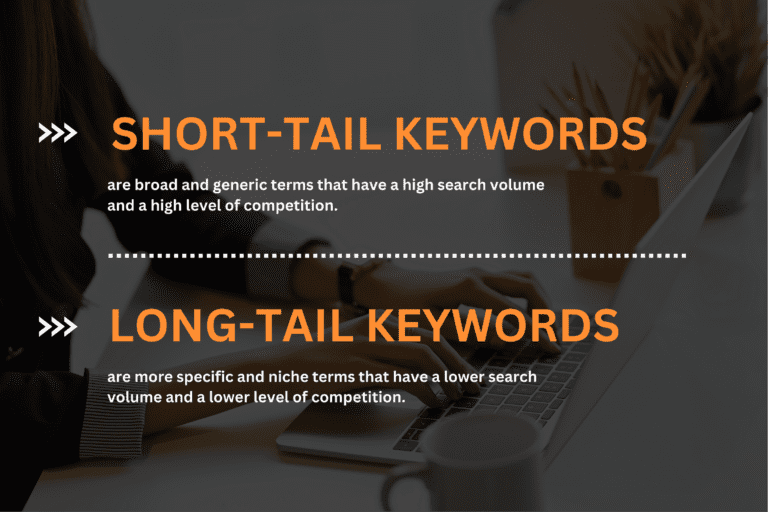
Short tail Keywords
These are known as broad keywords or head keywords and usually have one or two-word phrases. They often have a high search volume but are the most competitive ones.
Users search for these keywords when they don’t have any specific goals in mind or when they are just starting out their search. Moreover, these are harder to rank, especially for new or smaller websites.
An example of a short-tail keyword can be “solicitor”, “law firm” etc. These are popular search terms and don’t have enough information to help people find exactly what they want.
Long tail Keywords
These are longer keywords and specific in nature consisting of four or more words. They are highly focused and help people find exactly what they are looking for. Long tail keywords are easier to rank due to their low competition, and they can attract targeted traffic.
Let’s say someone wants to find a personal injury solicitor in the USA. They might search “personal injury solicitor in the USA”.
According to a study, about 91% of Google searches use long-tail keywords. These keywords help people find your law firm according to its specific area and are more helpful in attracting users who want your specific legal services.
Users search for these keywords when they don’t have any specific goals in mind or when they are just starting out their search. Moreover, these are harder to rank, especially for new or smaller websites.
An example of a Long-tail keyword can be “car accident solicitor in the USA”, “personal injury law firm” etc. These are popular search terms and don’t have enough information to help people find exactly what they want.
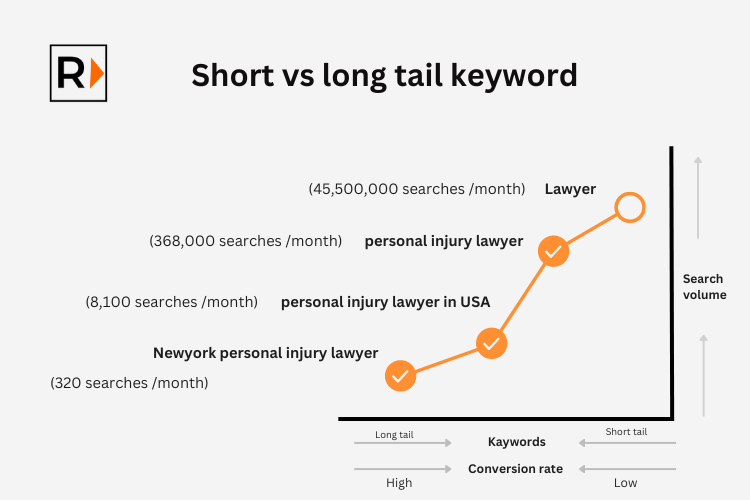
In short, using a mix of short-tail and long-tail keywords makes your law firm’s on-page SEO successful. By strategically using them, you can capture a wide range of potential clients. From those in the early research stages to those ready to take action, they will easily discover your legal services.
What is keyword Research?
- What is your target audience searching for?
- What is the intent behind their search, also known as user intent – that is, the main goal of the user?
- How many people are conducting searches for these keywords?
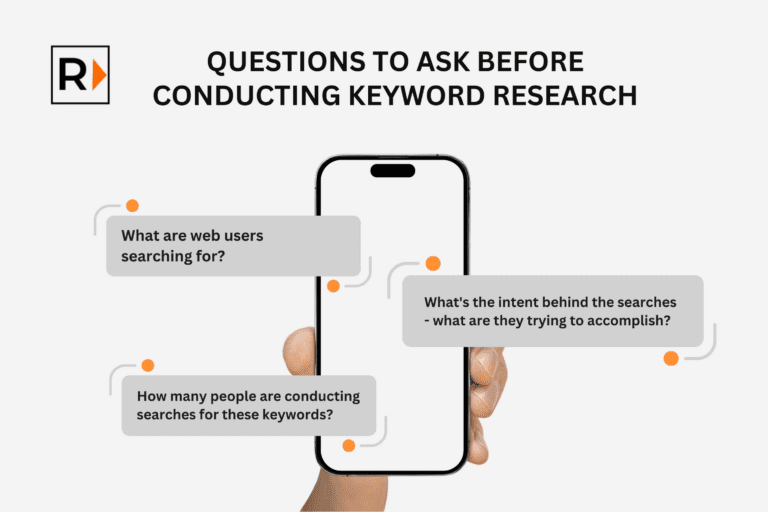
Your website’s content is based on keyword research, which is the foundation of search engine optimization. Using it, you can create hyper-relevant content tailored to your client persona based on what your audience is searching for.
How to Perform Keyword Research
Measuring the results of your social media campaigns is crucial to understand their effectiveness and to track the results that you are achieving.
The time and resources you invest in targeted keyword research will pay off in the long run.
We’ve listed a few tools, approaches, and processes to help you come up with a winning strategy.
Google’s Keyword Planner is one of the best and most used tools to help you identify what potential clients are typing into Google when searching for lawyers in your area.
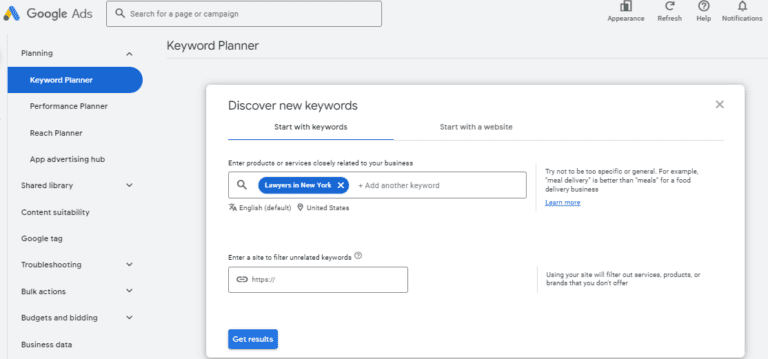
Another great option is Semrush. It is a paid tool used by most of writers and SEO specialists due to its comprehensive suite of digital marketing features.
You can start using SEMrush by typing in your practice area in the Keyword Magic tool.
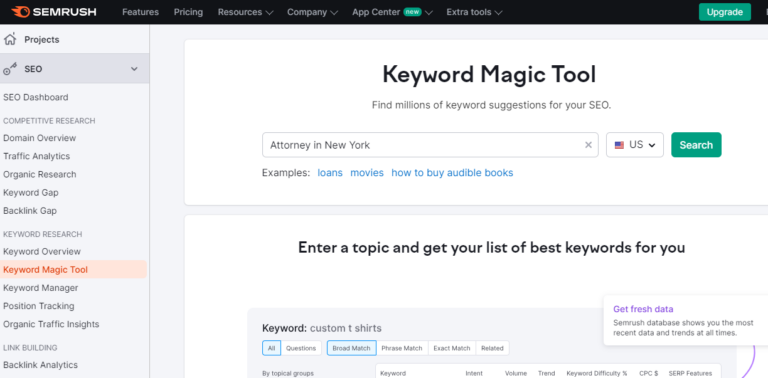
In the next step, you will see a list of the keywords the tool believes would be relevant to you, including the average number of searches per month and how difficult it will be for you to rank for them.
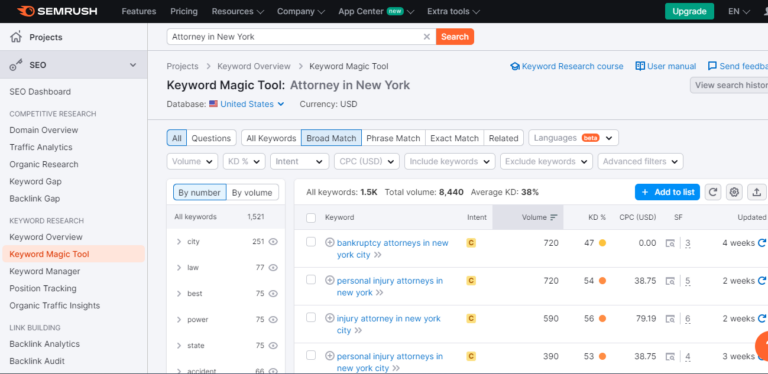
Additionally, you can see related keywords and questions that searchers are typing into Google.
In this way, you can find keywords relevant to your practice area and continue to narrow down your search.
For example, someone may want to get keywords for “car accident law firms.”.
They’d type “car accident law firms” into the Keyword Magic tool and look at the “Broad Match,” “Related,” and “Questions” tabs to see all the variations of that long-tail keyword.
To get even more targeted keyword suggestions, we recommend adding your location to Keyword Magic. So, “car accident law firms” would become “car accident law firms in New York.”
Analyze Your Competitors' Ranking Keywords
Discovering what keywords your competitors rank for can help you identify keywords for your law firm’s SEO campaign.
You can find metrics like volume and competition by using tools like Google’s Keyword Planner. Analyzing your competitors is an effective way to find keyword opportunities.
Competition refers to the difficulty of ranking for a specific keyword in your area, while volume refers to the number of searches a keyword receives in a month. It’s important to strike a good balance between both.
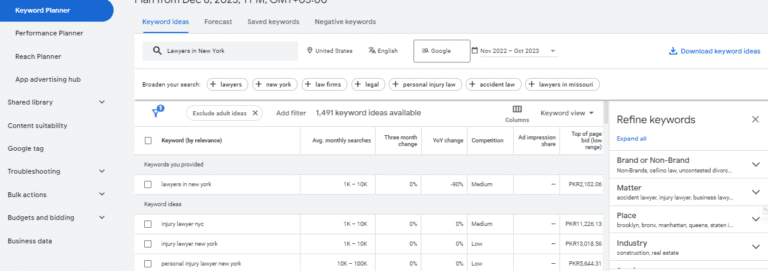
If you don’t know your competitors, tools like Semrush can show you the keywords they rank for, and their top pieces of content, or even identify them.
Start by typing the URL of one of your competitors in the Domain Overview tab.
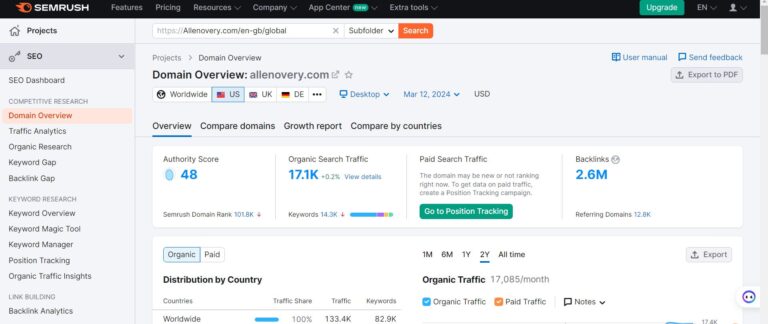
The Organic Research screen gives a lot of information about your competitor, but you’re more interested in the information about your own company.
If you scroll down to the Top Organic Keywords box and click “View details,” you will be able to see all the keywords your competitor ranks for. You can sort by volume, difficulty, rank, and more.
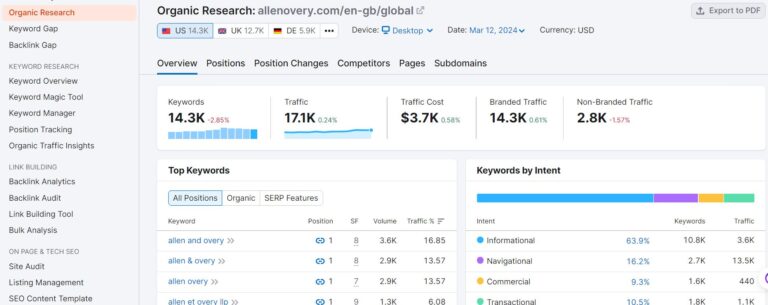
Using this method for all of your local competitors will help you determine which keywords are worth pursuing.
Once you’ve found their top-ranking content pieces, you can learn what keywords you should target.
Check Out What People Are Searching For
Using Google itself can be an easy way to find out what people are asking about your practice area.
Type in a keyword, like “personal injury lawyer in New York.”
Several questions related to the keyword you type will be listed under “People also ask” in the search results.
As they are actively searched for, these are good questions you might consider answering in your content.
You can search separately for more related questions for each question highlighted below. Targeting keyword phrases through this resource is like finding gold.
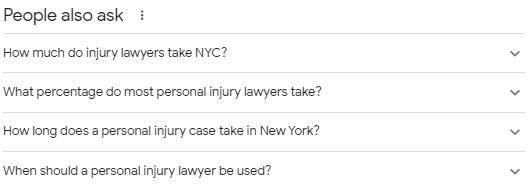
Despite the fact that Google generates these questions from thousands of possible options, it determined that those listed are most closely related to the original question.
Dig Into Legal Forum Q&A's
You can learn exactly what kind of legal questions people have by visiting sites like Avvo, Chambers & Partners, and Find a Attorney.
Forums like these offer a variety of Q&As, which can help you pinpoint appropriate keywords for content during the informational/awareness stage.
Here’s how the Avvo Q&A section looks.
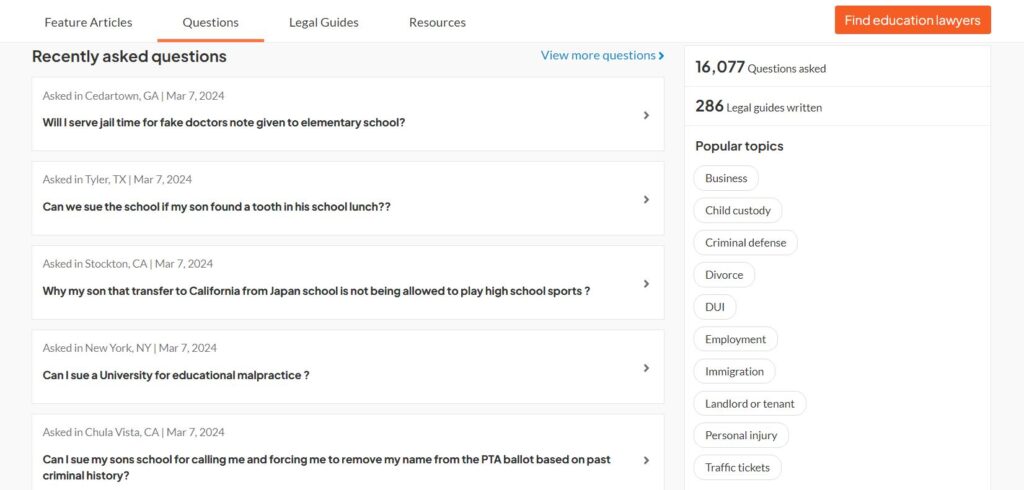
This is a list of questions asked by real people who are looking for legal advice. It is a great way to gain insight into potential clients’ minds.
2. Site Structure
Site structure is another important element of on-page SEO. It’s important to make navigating your website as easy as possible for users.
It should be easy for them to find the page they are looking for (which could lead them to leave your site in frustration).
There will be a Homepage (HP) and an enormous amount of supporting content on your website. The site structure consists of how content is grouped or nested underneath the HP. The process might seem straightforward, but it can get complicated.
Those with SEO-optimized domains include the keyword you intend to rank for in their URLs. However, short URLs tend to perform better than long ones.
Thus, flat website structures are often the best option in many cases.
We should also keep in mind the following two URL-related ranking factors:
URL Path and Length: Those pages that are near the home page may be ranked higher than those that are buried deep within the site.
Short URLs: More people tend to click on these than long URLs.
Here’s how you can utilize a flat URL structure if you have multiple locations. For example, consider a personal injury solicitor in Birmingham with head offices in New York and California.
- personalinjuryattorney.com
- personalinjuryattorney.com/newyork/
- personalinjuryattorney.com/newyork/car-accident-attorney/
- personalinjuryattorney.com/newyork/truck-accident-attorney/
- personalinjuryattorney.com/california/
- personalinjuryattorney.com/california/car-accident-attorney/
- personalinjuryattorney.com/california/truck-accident-attorney/
3. Optimizing Internal Links
The internal links on your website which are the links between individual pages play an important role in your site’s authority and are often overlooked as part of SEO.
Simply put, internal links connect each piece of content within your website. Through these connections, users can find relevant information well beyond what they initially searched for on Google.
The more internal links a page receives, the more equity it gains in Google’s eyes. We treat them as cornerstone content and rank them accordingly.
Moreover, those internal links also distribute that equity to the other pages to which they link.
It creates a network effect that benefits every linked page on your website. In one case study, it was shown that effective internal linking increased 40% of organic website traffic.

How To Optimize Internal Links?
You can optimize your internal links by taking the following steps:
- Link naturally: Don’t overload content with links. Pages with a lot of links may perform poorly due to some disadvantages. It is important for links to be deeply embedded in the content when they are done naturally.
- Make sure your links are relevant: Whenever you link two pieces of content that don’t have similar themes, don’t link blindly.
- Create user-focused links: External links should be user-centric as extensions of internal links. It means that you should not create internal links to placate Google’s algorithm. Readers will appreciate if the links are useful.
Create compelling content: Internal linking relies heavily on great content. You can create more internal links on your legal website if you have more content without linking to certain content too much.
4. Title Tag And Meta Description
Google Search Engine Results Pages display the page’s meta title and description tags when you search for a term. It is called a snippet when the meta title, description, and page URL are combined together.
Potential clients can learn about the topic of a page from the meta title and description. Google’s top rankings are largely dependent on the quality of the title and description.
It’s true that they don’t directly affect your rankings, but they have an effect on SEO nonetheless. Search engine results pages use meta descriptions to display a targeted message that can increase clickthrough rates and brand recognition.
In the absence of one, Google will pull one from your content. You can’t guarantee that it will be persuasive enough.

Follow these tips to optimize your title tags
- Keep your title simple (Google may penalize you for a title such as “Oxford Car Accident Attorney Law Firm”)
- Use lowercase instead of all caps
- Every page should have a unique tag
- When space allows, please include your brand
- If you go over 60 characters, Google usually cuts you off.
- Put your keyword at the beginning of the tag
5. Website Speed
Keeping an eye on your website’s performance is an essential part of any comprehensive on-site SEO strategy. When browsing for legal options, potential clients are often anxious.
If a website takes longer than three seconds to load, 53% of web users will return to Google’s search results. More than half of all web users prefer a site that loads in less than two seconds.
It has been found that 3 out of 4 mobile users will abandon a website if it takes more than 10 seconds to load.
It is estimated that a one-second delay in page load time reduces page views by 11% and conversions by 7%
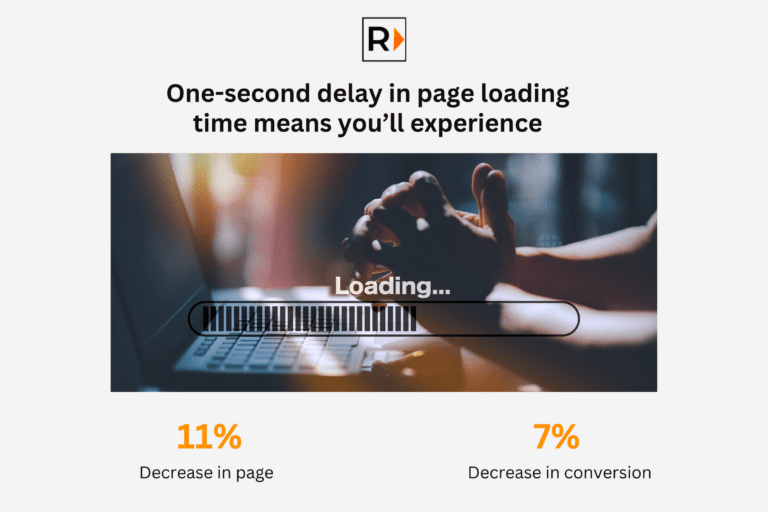
Your site’s loading speed is directly related to the user experience. If your site loads quickly, positive user experiences will be rewarded – Google will probably move it up the ladder and put it at the top of search results.
6. How Do You Check Lawfirm Website Speed?
Considering how important speed is to Google rankings, you may wonder how you can check your website’s speed. Despite what you might think, you won’t be the only solicitor’s page on the web.
Similar services are offered by other blogs and pages. It is imperative that your website loads quickly if you want to stay competitive.
Testing your website’s speed can help you decide whether to improve it. There are many platforms that offer website speed testing services. You should always test two different services to be on the safe side. Google PageSpeed Insights is an example of a tool you can use.
Here’s the result of law firm website we tested:
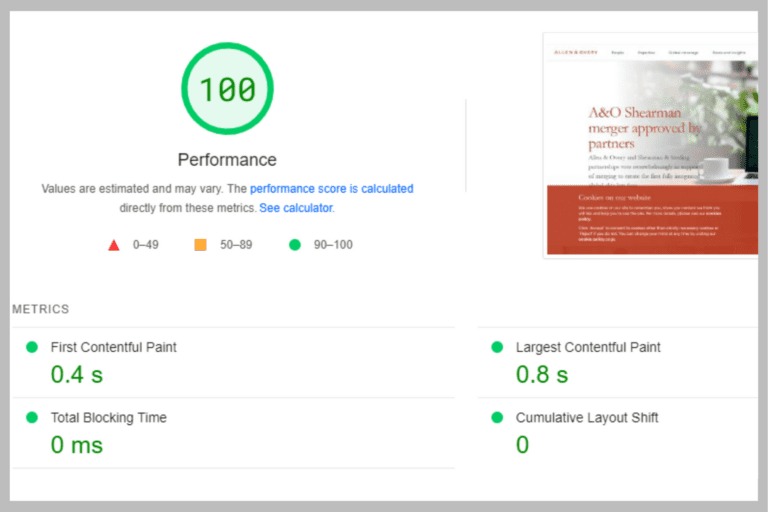
Here are some tips to improve you page speed:
- Redirecting a page more than once makes it take longer to load, so to improve speed you should reduce the number of redirects a page has.
- Compress and optimize scripts with a caching plugin.
- You should compress all the images on your website (uncompressed high-resolution images are the biggest slowdown).
Use a high-end hosting platform that doesn’t drive traffic away.
7. Adopt Schema
An individual might be able to understand what a website is about simply by looking at it, but Google’s bots have a harder time understanding. It’s here that schema – or on-page markup – comes into play. To help Google better understand what a website is about, schema is coded text that is added to the backend. Markup helps the site’s content to have semantic meaning.
In order to determine what value web pages offer, Google needs to understand their purpose. The schema markup on the solicitor page can give the search engine a vivid description of the solicitor’s practice.
You can use it to tell Google exactly what your site is about and when it should appear in search results. Moreover, your chances of ranking on a website increases by providing on-page markup.
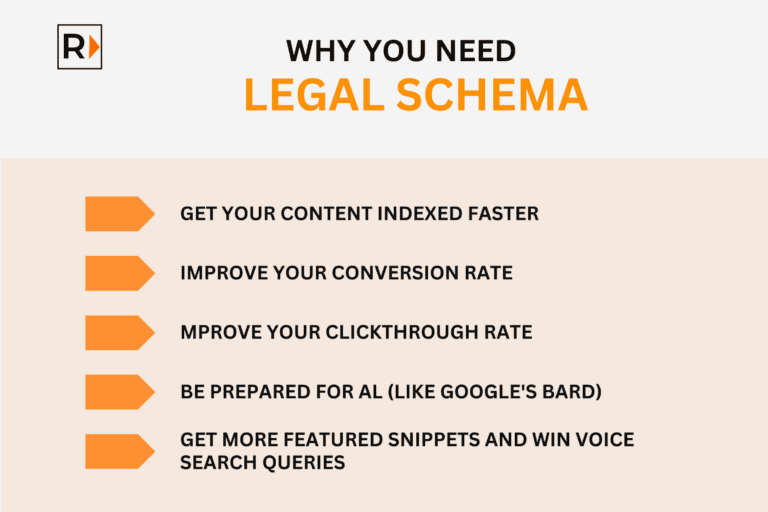
What Is Off-Page SEO For Law Firms?
A website’s off-page SEO, plays an important role in optimizing it for search engines. Using off-site SEO means generating positive ranking signals by acting outside your law firm’s website – external actions you take that enhance your brand’s awareness.
It involves gaining backlinks from reputable law-related websites, getting involved with social media, and soliciting reviews to improve your website’s reputation and visibility.
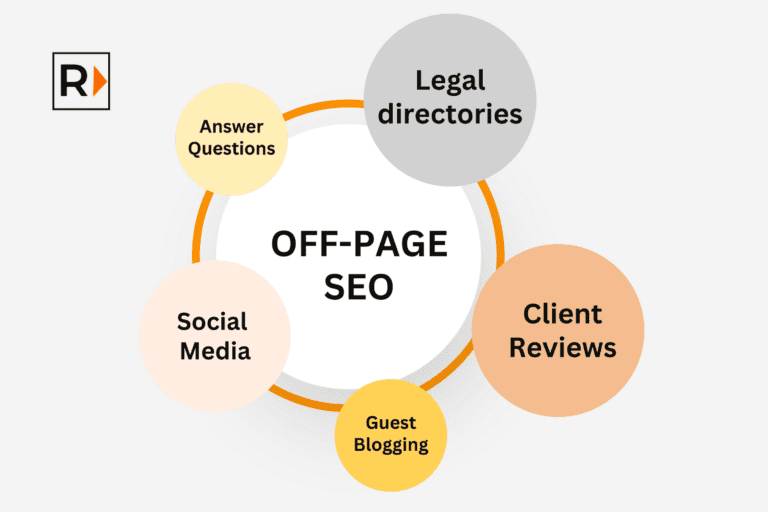
Off-Page SEO Factors That Influence Your SEO Efforts
Further we will be diving into each off-page SEO factors in detail. Let’s have a look at them:
1. Legal Directories
The importance of directories in link building cannot be overstated. So make sure your profile is listed on top directories such as Avvo, Legal 500, Chambers & Partners or Find a Attorney.
It is best to select legal directories with high domain authority, lots of traffic, and positive reviews.
You can greatly benefit from claiming your profiles and optimising them as part of your overall SEO strategy. You can do this by adding images to your website, increasing your rating, and linking back to it.
With this simple step, you can establish your law firm or practice as an authority to Google and attract more clients.
2. Client Reviews
Having reviews or testimonials helps potential clients understand your products and services better, as well as being important for SEO. Lawyers can benefit from an SEO service by figuring out how to request reviews organically.
Using them as evidence is a good idea. There is a good chance that your visitors will expect to see other people saying positive things about your law firm.
It is somewhat difficult to control reviews. You can’t write them yourself or have clients post them for you. The best thing you can do is encourage your former clients to write reviews and be active in responding to each review.
Be sure to respond both to good and bad reviews. In this way, you’ll show potential clients that you’re engaged and involved, something that many clients look for in a solicitor
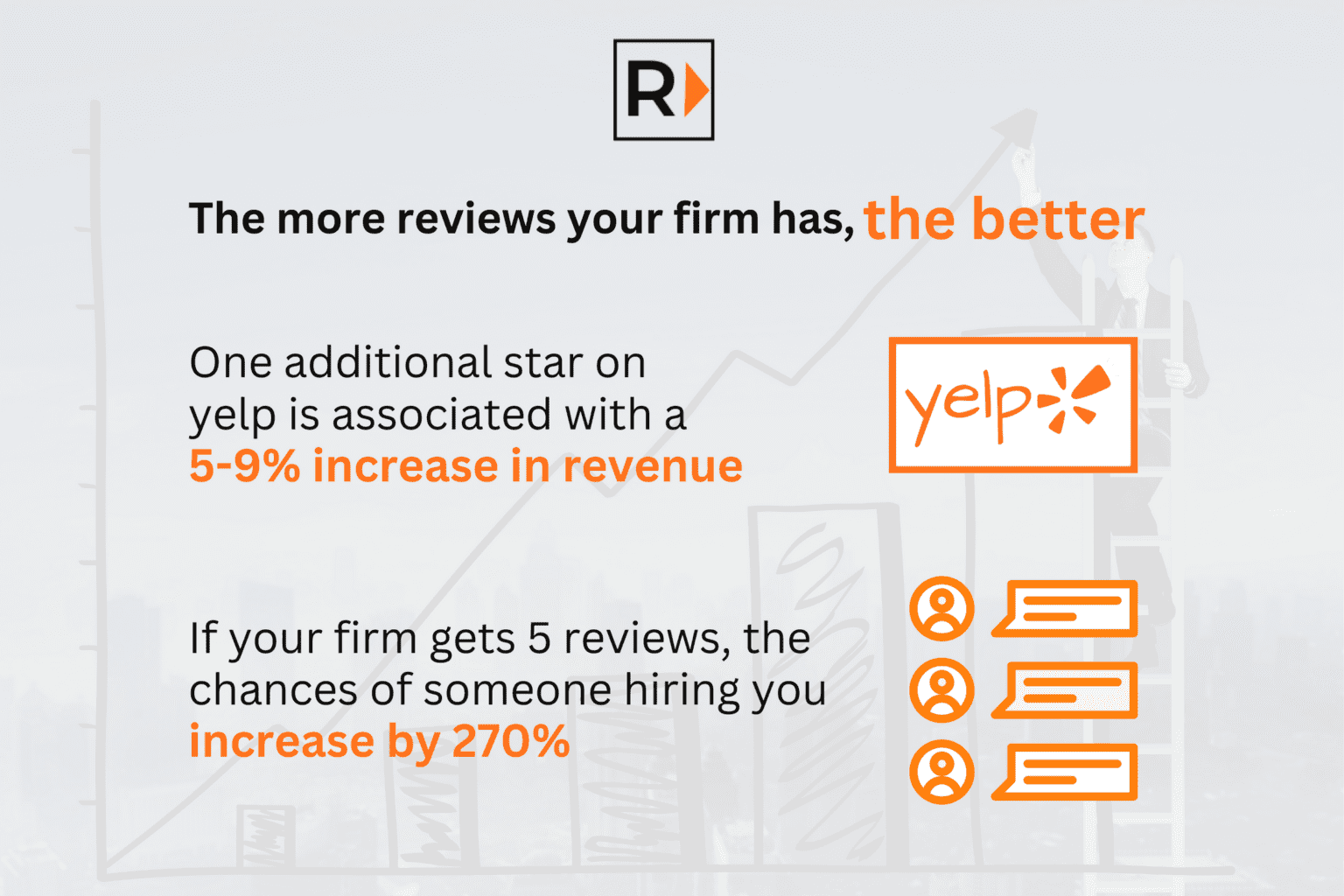
Online reviews are now considered as trustworthy as personal recommendations. Local businesses are perceived as trustworthy when they have good ratings. In order to attract clients, you absolutely need them. Local search rankings are heavily influenced by reviews from an SEO perspective. Google says so in its guide: improve your local search ranking.
The 2024 Local Consumer Review Survey from Bright Local illustrates the importance of actively soliciting reviews.
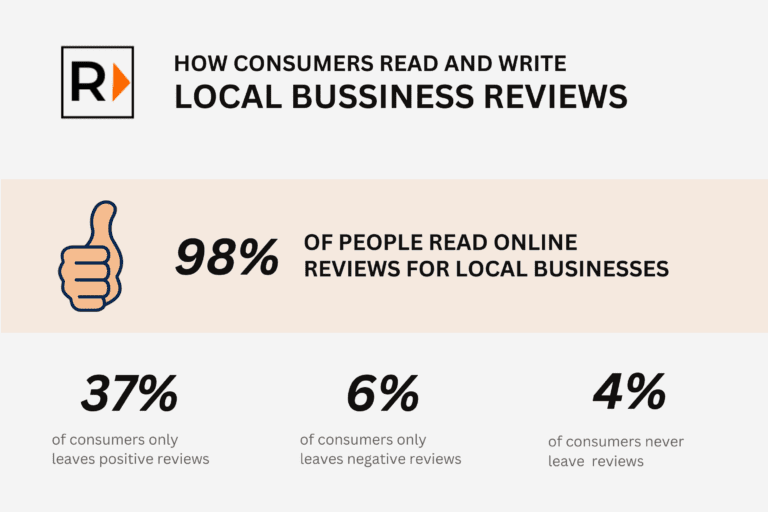
3. Answer Questions
One of the best way to increase your law firm’s awareness, establish credibility, and eventually establish yourself as an authority is to participate in online communities. Answer questions on websites such as Reddit, Quora, and Lawyers.com.
You can make people trust your firm by staying active in online groups. Share your thoughts and advice with people who need help. Discuss serious questions with people.
Give your advice and opinions within the boundaries of the law and your state’s ethics rules. This would be a good opportunity for you to link to the website of your firm.
4. Social Media
Despite Google’s lack of consideration of social signals as a ranking factor, social media still impact search rankings. More than 1.845 billion daily active users are on Facebook, and another 450 million are on Instagram and Snapchat. Every day, Facebook users share 4.75 billion items.
That’s why maintaining an active social media presence is crucial. It can help you:
Bring in new leads who wouldn’t have found your company otherwise.
Make yourself an authority by increasing your E-A-T.
Get more reviews for your local SEO.
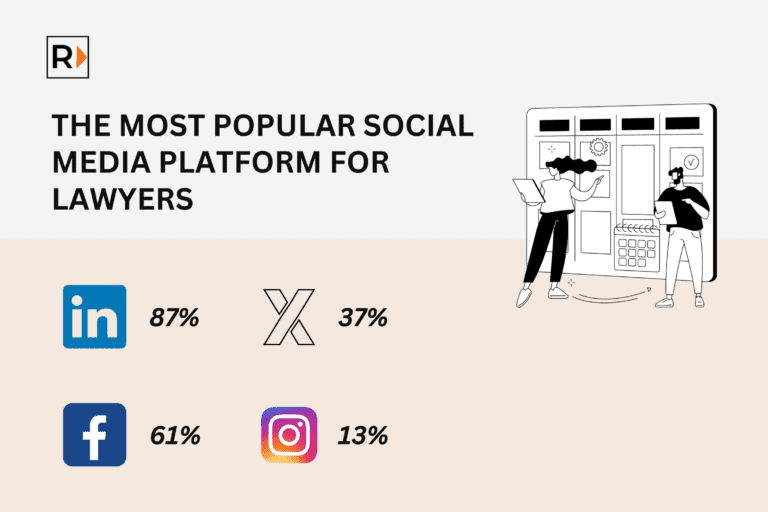
Follow these steps to get started with social media:
These small steps can make a big difference when someone needs a solicitor.
- Create your profile on Facebook, Instagram, LinkedIn, and Twitter.
- Share valuable content that shows your expertise and builds your credibility.
- Engage with others and get influencers in your corner.
- Show your authority by answering questions when they arise.
If you want unbeatable SEO services for your law firm, we can provide you with the ones that meet all your marketing needs within a competitive budget.
5. Local SEO
It is more common for law firms to target the local area as a rich potential source of new clients rather than targeting the entire country. That’s why it is crucial for you to prioritize local search in order to accomplish this goal online.
The goal of local SEO is to reach people in your local geographic area rather than across the country. If you’re a divorce solicitor in London, you’re much more likely to rank for keywords like “London divorce solicitor” rather than “USA divorce solicitor.”
In more specific terms, you want to show up on local maps. Approximately 46% of searches made daily have local intent, with 93% showing Local Map Packs.
To learn more about how you can optimise your law firm for local SEO, check out our ultimate marketing guide.

6. Link Building
Link building involves getting more websites to link to your site. Your website can rank higher on search engine results pages with a carefully planned link-building campaign. Due to the fact that Google considers links from reputable and relevant websites as digital votes of confidence. Google is more likely to consider your website a valuable resource if more people link to it.
There are a number of reasons why backlinks are important, among them being a confirmed Google ranking factor. There is a correlation between pages with many backlinks and those with fewer backlinks in search engine results. It is estimated that the #1 result in Google has 3.8x more backlinks than the 2nd to 10th results.

There are many strategies that you can use to acquire them. We have discussed them in detail in our ultimate marketing guide.
For now have a let’s have quick look at each strategy:
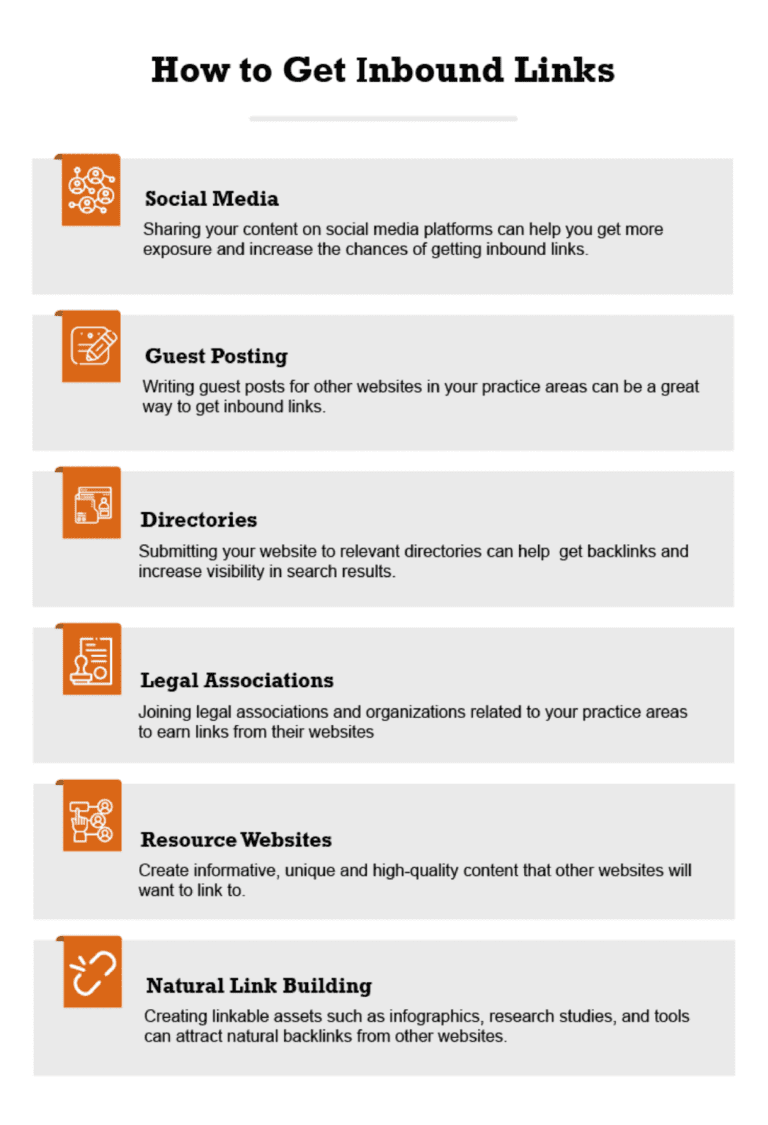
Any law firm’s marketing strategy relies heavily on SEO for lawyers, and will do so for many years to come. Thanks for reading this far! By now, you have most of what you need to know about SEO basics.
Here are a few things to keep in mind:
- Focus on building your authority.
- Comply with Google’s guidelines and rules.
- Make your content SEO optimized, relevant and informative.
- A great user experience gives boost to your SEO efforts.
If you want unbeatable SEO services for your law firm, we can provide you with the ones that meets all your marketing needs with in a competitive budget.
If you need further assistance or have any questions, reach out for a free consultation.
Free Consultation
Book a Free Guide for SEO Consultation
One of our SEO specialists will contact you to discuss your budget and needs.
If we sound like a fit, we will prepare a proposal within 24-48 business hours
